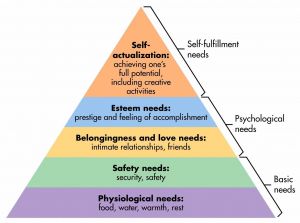Maslow's hierarchy: Difference between revisions
mNo edit summary |
mNo edit summary |
||
| Line 8: | Line 8: | ||
In relation to the [[ecological crisis]], a human's basic needs need to be met before they can address these issues. | In relation to the [[ecological crisis]], a human's basic needs need to be met before they can address these issues. | ||
<HTML><p align="center"><iframe src="https://giphy.com/embed/wRU2aOd8k8OazFb53j" width="100%" height="248" frameBorder="0" class="giphy-embed" allowFullScreen></iframe | <HTML><p align="center"><iframe src="https://giphy.com/embed/wRU2aOd8k8OazFb53j" width="100%" height="248" frameBorder="0" class="giphy-embed" allowFullScreen></iframe></HTML> | ||
Revision as of 23:16, 20 November 2022
Everyone is driven to do stuff by a need, this object oriented process is mediated in the brain by neurochemistry.
If you are hungry you buy some food, if you are thirsty you buy water. These basic needs can be categorised into what is most powerful and therefore comes first, i.e. you wouldn't worry about your self esteem if you were starving. After the basics are covered you proceed up to another category of needs, Safety and so on. Maslow thought about this enough to create a human hierarchy of needs, the idea is that once a lower level is fulfilled a person moves to the next, stage above.
Maslow's Hierarchy and Environmentalism
In relation to the ecological crisis, a human's basic needs need to be met before they can address these issues.
Universal Basic Income, the idea where a central body provides the lower rungs has been shown to decrease mental health issues[1] and allow people to not behave in environmentally destructive work patterns and concentrate on other things.
References
- ↑ Canada’s forgotten universal basic income experiment: https://www.bbc.com/worklife/article/20200624-canadas-forgotten-universal-basic-income-experiment
